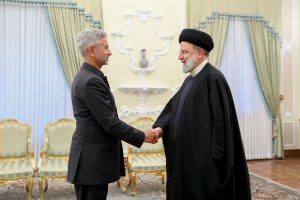Voting in India’s multiphase general elections is in progress, and Prime Minister Narendra Modi and his Bharatiya Janata Party (BJP) are vying for a single-party majority in Parliament for a third consecutive term.
Although a significant part of the BJP’s campaign is predicated on the religious tempers that have vitiated India’s domestic politics, Modi’s appeal is also based on the promise that he can restore India to power and glory on the world stage. To that end, Modi and the BJP have been showcasing his government’s record in foreign policy. In one speech, Modi’s close aide and Home Minister Amit Shah said, “These elections are to make India a completely developed nation, and to make Bharat Mata (Mother India) a Vishwa Guru (world teacher).”
Yet, the world is increasingly rife with conflict, complicating India’s designs for global power. In recent weeks, Iran and Israel have traded missile strikes, keeping much of the Middle East on edge. That conflict continues to fester after lawmakers in the United States House of Representatives cleared a fresh slate of military aid to Israel over the weekend.
Last week, Iran seized a merchant ship with 17 Indian crew members from the Strait of Hormuz, claiming that it was linked to Israel. New Delhi has since been engaged in intense negotiations with Tehran, resulting in the release of one crew member.
Even before Iran seized the merchant vessel, New Delhi was concerned about the economic repercussions of the widening war. Much of India’s energy supply and trade interests run through the Strait of Hormuz and the Red Sea, where Yemen’s Houthi rebels have attacked several shipping vessels in solidarity with Gaza. Disruptions to that trade could drive inflationary pressures in India’s economy. In addition, India is also increasingly worried about the future of its critical connectivity initiatives in the region — in particular, the India-Middle East-Europe Economic Corridor (IMEC), which was launched during last year’s G20 Summit in New Delhi.
But aside from these obvious economic risks, India also faces a larger, more enduring risk that goes beyond the current war in Gaza: establishing itself as an influential voice in a world where geopolitical warmongering is the new normal. India increasingly risks getting drowned out amid the din.
This month, U.S. National Security Adviser Jake Sullivan canceled a planned trip to India, where he was due to review progress on the flagship India-U.S. initiative for Critical and Emerging Technologies (iCET). This was the second time this year that Sullivan had canceled a trip to India. In February, he was scheduled to visit New Delhi for the annual Raisina Dialogue and a review of iCET. On both occasions, Washington cited the wars in Ukraine and the Middle East as the primary reason for the cancellation of his visit.
Although the White House took pains to clarify the significance of the India relationship, the message was still awkward: There are other urgent priorities and India can wait.
The proliferation of wars and global instability therefore presents India with two major challenges: one, creating jobs for its massive youth population in an age where trade, immigration, and energy supplies are increasingly volatile; and two, establishing global relevance for itself while remaining neutral on the world’s dominant geopolitical crises.
On Ukraine, New Delhi had managed these competing imperatives fairly well, but it was also helped to some extent by the nature of that conflict. Large parts of the Global South were skeptical of Western appeals for the isolation of Russia and saw tinges of a Eurocentric worldview in that narrative.
India’s External Affairs Minister Subrahmanyam Jaishankar had ridden that wave well by admonishing the West for its interventions in Asia and Afghanistan. “Europe has to grow out of the mindset that Europe’s problems are the world’s problems but the world’s problems are not Europe’s problems,” he once said. These arguments had played well with much of the developing world, which saw India’s strengthened economic ties with Russia as strategic cover for their own engagement with Moscow.
Yet, on Gaza, India has been rendered an outlier in the developing world, where solidarity with Palestine has long been a norm. Anti-Israel protests have dominated discourse across much of the Global South, as narratives of a lopsided war have appalled the public imagination. The country that has led the multilateral effort against Israel for its alleged war crimes is South Africa — a key Indian ally in the developing world.
Things haven’t necessarily been easier in relations with the West. If Washington was peeved at New Delhi’s show of neutrality on Ukraine, it should have been pleased by India’s more full-throated support for Israel. Yet, Sullivan’s postponed visits serve to demonstrate a starker problem: By lacking the presence and leverage to influence either party in the war, India is struggling to carve a relevant niche for itself or assert its power.
Modi wants to establish India as a leading global voice while remaining strategically silent on the world’s geopolitical conflicts. It is becoming increasingly difficult to achieve those objectives together.

































